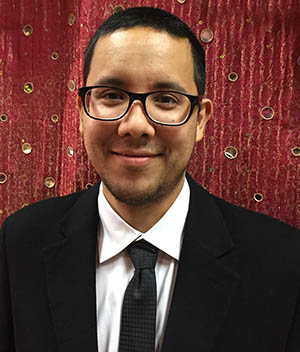CUIN M.Ed. Alum Evan Vargas Publishes in the Colorado Reading Journal
 Curriculum & Instruction M.Ed. alum Evan Vargas has recently published a paper in the Colorado Reading Journal. His paper titled Digital literacies and innovative classroom practices: I’m comprehending with Imojis (page 16) was submitted in CUIN 7325: Materials for Reading and Language Arts Instruction taught by professor Lee Mountain.
Curriculum & Instruction M.Ed. alum Evan Vargas has recently published a paper in the Colorado Reading Journal. His paper titled Digital literacies and innovative classroom practices: I’m comprehending with Imojis (page 16) was submitted in CUIN 7325: Materials for Reading and Language Arts Instruction taught by professor Lee Mountain.
Vargas never dreamed of going to college because he thought it was unattainable. His mother, on the other hand, believed it was a right, something he had to capitalize on, despite his mediocre grades, and lack of college readiness. “I remember taking some higher courses in high school and even in college, and unfortunately I had some experiences that were two-themed, both good and bad,” said Vargas. “Teachers would criticize the delivery of my thought, from grammar to rationale, and I would feel stuck.”
But, somehow Vargas realized they were secretly presenting a challenge: if you really want to be in my class, prove it! “And I answered their challenge, despite being fearful, timid, and always unsure of my own ideas,” he said. “Having published a text, reassures me that I do have something valuable to offer.”
The subject of Vargas’ paper is in-between academic and novelty some might say, a place that he dabbles in. “Having struggled with communication as a child, I looked to technology to express myself in order to deal with the inner struggle of feeling lost or not belonging,” he said.
In his paper Vargas utilizes web-based apps to incorporate visual media to strike adjectival vocabularies with the aid of humor via imojis, which are like memes, but specifically cropped images of famous celebrities making funny faces. “I became inspired during a sad and challenging time within my family, dealing and coping with the decline of my mother,” said Vargas. “When I found myself in the waiting room, I would e-message updates to my family. I would ease the tension with imojis that overly expressed the situation, or shift the focus when the messages got tough.” Vargas realized that physiognomic images say a lot, and thought that could be surely used in his classroom.
When asked what professors have inspired him the most, Vargas informed us that he heard Mountain’s courses were challenging and engaging. ”During my last semester of enrollment, a course I needed was not available, and she suggested a replacement course that would help with my academic writing, which was an advanced seven-thousand level course,” he said. “Though I felt overwhelmed with the company I had in the class, Dr. Mountain scaffolded my abilities and learning and motivated all of us to publish, and to my surprise I have an article and presented at two conferences.”
Vargas’ research interests are varied, and at times come from an observer’s perspective rather from a clinical one. “For instance, I am interested in seeing how discussion threads, visual media, and collaborative experiences can assist with critical thinking and application,” he said. “However, I am also interested in abstract ideas such as democracy, equity, and literature aesthetics from a hobbyist perspective.” Though Vargas has many interests, technology and social media and its application is most likely where his research aim will be in the future.